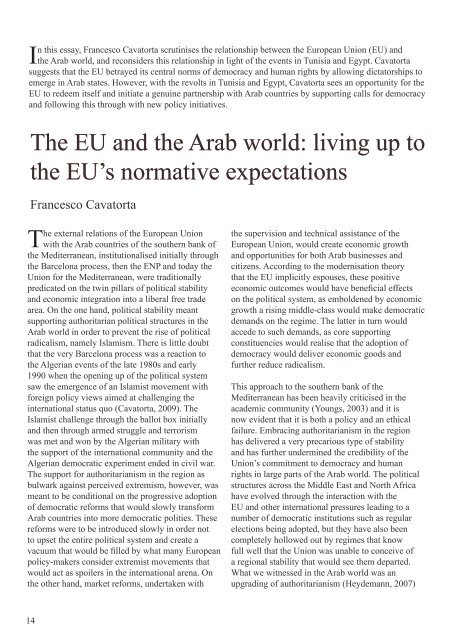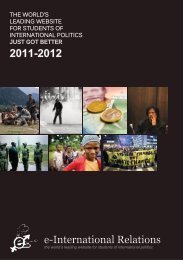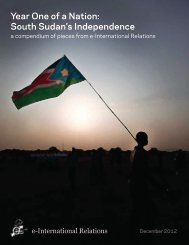The Arab Spring of Discontent - e-International Relations
The Arab Spring of Discontent - e-International Relations
The Arab Spring of Discontent - e-International Relations
Create successful ePaper yourself
Turn your PDF publications into a flip-book with our unique Google optimized e-Paper software.
I<br />
n this essay, Francesco Cavatorta scrutinises the relationship between the European Union (EU) and<br />
the <strong>Arab</strong> world, and reconsiders this relationship in light <strong>of</strong> the events in Tunisia and Egypt. Cavatorta<br />
suggests that the EU betrayed its central norms <strong>of</strong> democracy and human rights by allowing dictatorships to<br />
emerge in <strong>Arab</strong> states. However, with the revolts in Tunisia and Egypt, Cavatorta sees an opportunity for the<br />
EU to redeem itself and initiate a genuine partnership with <strong>Arab</strong> countries by supporting calls for democracy<br />
and following this through with new policy initiatives.<br />
<strong>The</strong> EU and the <strong>Arab</strong> world: living up to<br />
the EU’s normative expectations<br />
Francesco Cavatorta<br />
<strong>The</strong> external relations <strong>of</strong> the European Union<br />
with the <strong>Arab</strong> countries <strong>of</strong> the southern bank <strong>of</strong><br />
the Mediterranean, institutionalised initially through<br />
the Barcelona process, then the ENP and today the<br />
Union for the Mediterranean, were traditionally<br />
predicated on the twin pillars <strong>of</strong> political stability<br />
and economic integration into a liberal free trade<br />
area. On the one hand, political stability meant<br />
supporting authoritarian political structures in the<br />
<strong>Arab</strong> world in order to prevent the rise <strong>of</strong> political<br />
radicalism, namely Islamism. <strong>The</strong>re is little doubt<br />
that the very Barcelona process was a reaction to<br />
the Algerian events <strong>of</strong> the late 1980s and early<br />
1990 when the opening up <strong>of</strong> the political system<br />
saw the emergence <strong>of</strong> an Islamist movement with<br />
foreign policy views aimed at challenging the<br />
international status quo (Cavatorta, 2009). <strong>The</strong><br />
Islamist challenge through the ballot box initially<br />
and then through armed struggle and terrorism<br />
was met and won by the Algerian military with<br />
the support <strong>of</strong> the international community and the<br />
Algerian democratic experiment ended in civil war.<br />
<strong>The</strong> support for authoritarianism in the region as<br />
bulwark against perceived extremism, however, was<br />
meant to be conditional on the progressive adoption<br />
<strong>of</strong> democratic reforms that would slowly transform<br />
<strong>Arab</strong> countries into more democratic polities. <strong>The</strong>se<br />
reforms were to be introduced slowly in order not<br />
to upset the entire political system and create a<br />
vacuum that would be filled by what many European<br />
policy-makers consider extremist movements that<br />
would act as spoilers in the international arena. On<br />
the other hand, market reforms, undertaken with<br />
the supervision and technical assistance <strong>of</strong> the<br />
European Union, would create economic growth<br />
and opportunities for both <strong>Arab</strong> businesses and<br />
citizens. According to the modernisation theory<br />
that the EU implicitly espouses, these positive<br />
economic outcomes would have beneficial effects<br />
on the political system, as emboldened by economic<br />
growth a rising middle-class would make democratic<br />
demands on the regime. <strong>The</strong> latter in turn would<br />
accede to such demands, as core supporting<br />
constituencies would realise that the adoption <strong>of</strong><br />
democracy would deliver economic goods and<br />
further reduce radicalism.<br />
This approach to the southern bank <strong>of</strong> the<br />
Mediterranean has been heavily criticised in the<br />
academic community (Youngs, 2003) and it is<br />
now evident that it is both a policy and an ethical<br />
failure. Embracing authoritarianism in the region<br />
has delivered a very precarious type <strong>of</strong> stability<br />
and has further undermined the credibility <strong>of</strong> the<br />
Union’s commitment to democracy and human<br />
rights in large parts <strong>of</strong> the <strong>Arab</strong> world. <strong>The</strong> political<br />
structures across the Middle East and North Africa<br />
have evolved through the interaction with the<br />
EU and other international pressures leading to a<br />
number <strong>of</strong> democratic institutions such as regular<br />
elections being adopted, but they have also been<br />
completely hollowed out by regimes that know<br />
full well that the Union was unable to conceive <strong>of</strong><br />
a regional stability that would see them departed.<br />
What we witnessed in the <strong>Arab</strong> world was an<br />
upgrading <strong>of</strong> authoritarianism (Heydemann, 2007)<br />
that was satisfactory to both the US and the EU<br />
(Durac, 2009). Pushing for modernisation through<br />
the adoption <strong>of</strong> market reforms brought aggregate<br />
growth for most <strong>Arab</strong> countries, but unfair trading<br />
practices and the hijacking <strong>of</strong> reforms on the<br />
part <strong>of</strong> elites close to the various regimes meant<br />
that there were no trickledown effects (Dilmann,<br />
2002). In fact, what we have seen in the <strong>Arab</strong><br />
world over the course <strong>of</strong> the last two decades is<br />
the rise <strong>of</strong> networks <strong>of</strong> economic patronage that<br />
accentuated the differences in the distribution <strong>of</strong><br />
wealth (Heydemann, 2004). <strong>The</strong> case <strong>of</strong> the Ben Ali<br />
and Trabelsi clans in Tunisia is but one example <strong>of</strong><br />
how rulers and their families and clans benefitted<br />
economically through their predatory behaviour. For<br />
some (Nasr, 2010), there is an <strong>Arab</strong> middle class that<br />
has grown and taken advantage <strong>of</strong> the possibilities<br />
that globalisation and economic integration has<br />
brought about, but this might be true only in small<br />
Gulf states. <strong>The</strong> ‘revolutions’ in Tunisia and Egypt<br />
and the widespread dissatisfaction <strong>of</strong> large sectors <strong>of</strong><br />
the population in Yemen, Syria, Bahrain and Libya<br />
are rooted in economic desperation as they are in<br />
political dissatisfaction.<br />
<strong>The</strong> European Union has purposefully supported<br />
regimes with very little legitimacy and it now<br />
finds itself in a desperate search for an alternative<br />
approach to the region. Designing a new set <strong>of</strong><br />
external relations with <strong>Arab</strong> countries in light <strong>of</strong> the<br />
changes taking place there would have been easier<br />
if EU policy-makers had made more serious attempt<br />
to engage with different sectors <strong>of</strong> <strong>Arab</strong> society<br />
rather than sticking to the ruling elites and to the<br />
small liberal opposition elite that embassies tended<br />
to rely on. <strong>The</strong> EU has not built solid links with<br />
genuinely popular opposition movements and in<br />
addition forced drastic economic changes that might<br />
have been necessary, but that, when implemented by<br />
largely corrupt and illegitimate elites, proved to drive<br />
large sectors <strong>of</strong> the <strong>Arab</strong> population, particularly in<br />
the Maghreb, into further relative poverty. It is not,<br />
therefore, a surprise that the recent events in Tunisia<br />
and Egypt have destabilised the manner in which<br />
the European Union deals with its <strong>Arab</strong> neighbours.<br />
<strong>The</strong> changes in Egypt and Tunisia are increasingly<br />
significant and while numerous obstacles remain on<br />
the path to democratization, there is no doubt that<br />
the EU has been on the wrong side <strong>of</strong> history and<br />
cannot claim to have had any positive role in such<br />
changes. Popular revolts, however they might end,<br />
indicate a pr<strong>of</strong>ound malaise in <strong>Arab</strong> societies and<br />
the EU has to take some responsibility for creating<br />
such malaise through its pandering to authoritarian<br />
regimes and policy choices. <strong>The</strong> credibility <strong>of</strong> the<br />
European Union has been undermined not only<br />
because it pursued policies that partly led to such<br />
uprisings, but also because sticking to relations with<br />
discredited regimes and co-opted or ideologically<br />
marginal actors prevented the EU from having a<br />
clearer knowledge <strong>of</strong> what was occurring at the<br />
societal level. Was the EU aware <strong>of</strong> the pr<strong>of</strong>ound<br />
dissatisfaction <strong>of</strong> sectors <strong>of</strong> the pious middleclass<br />
about the absence <strong>of</strong> personal freedoms and<br />
the patronage system that characterised access to<br />
economic resources? Was the EU aware <strong>of</strong> the<br />
pr<strong>of</strong>ound imbalances <strong>of</strong> the Tunisian and Egyptian<br />
economy that drove many in the countryside to<br />
abject poverty? Was the EU interested in the reasons<br />
that led to a significant increase in strikes and<br />
demonstration to achieve better working conditions<br />
that occurred in Tunisia, Egypt, Morocco and<br />
Algeria over the last few years? If the EU was aware<br />
<strong>of</strong> all <strong>of</strong> this, how did it respond? <strong>The</strong>se are the<br />
questions that EU citizens should ask their political<br />
representatives, who have to be held accountable for<br />
policies that not only failed in practice, but that were<br />
also ethically condemnable.<br />
<strong>The</strong>re are a number <strong>of</strong> lessons that can learnt from<br />
these events and one mistake that must be avoided<br />
from the EU’s perspective. First <strong>of</strong> all, the EU must<br />
live up to its normative foundations when interacting<br />
with other states. This does not mean adopting an<br />
14 15







